May 1, 2018 | Non categorizzato
Chocolate Factory During the summer I travelled with a friend to Germany, to work in a well-known chocolate factory but we were given a very cold welcome by the 400 employees. One woman in particular was particularly grumpy towards me. One day, she made a big mistake that could have been very costly for her. When the section manager arrived, without even hesitating, I took the blame for the mistake. I was severely reprimanded and told that it could cost me my job if it happened again. But I was happy: I had done it to Jesus in my colleague. That gesture impressed my co-workers. From then on the atmosphere changed; we began to treat each other more cordially and, when the time came to leave, it felt like leaving a real family behind. Krisztina – Romania The Great Novelty During a meeting at the parish I remained quite struck by the joy and simplicity of one group of guys who were more or less the same age as me. For someone like me who only ran to God in times of trouble, hearing people talk about God as Love was a novelty. Without reasoning it out too much, I decided to do as they were doing. First, I started helping around the house and keeping an eye on my little sister. One Sunday, I even skipped football match in order to help my Dad put up a roof. At school, instead of studying alone as I usually did, I helped some friends with their studies. Daniel – Argentina At the Supermarket I went to the usual supermarket to pick up some things for a supper with thirty boys at our house and, since I would be busy at a meeting for a few days, I thought I would do one big shopping that I could leave at home. As I was placing the groceries onto the check-out counter, I noticed the woman behind me with only a few items. Behind her was an elderly woman with ten tissue boxes. I asked her if she wanted to go ahead of me. She told me that her husband had gone to get a case of water. When her husband came, I let him go ahead of me as well. Then, I began filling up my many shopping bags. In the end, the cashier pulled out the receipt and said to me: “Today you don’t have to pay anything!” I thought it was a joke. The cashier asked me my name. “Chiu”, I said. I heard over the loud-speaker: “Today, Miss Chiu has won 107 Euros!” I never imaged this would happen to me when I loved my neighbour behind me in the queue ! Chiu – Hong Kong Grocery Stores I run a grocery store and so I’m used to the commercial world where profit comes first – not the customer. I met several Christians who try to put Jesus’s commandment of love into practice. I thought: if they can do it, why can’t I? The next morning I thought: I don’t want to go on weighing the goods with two heavy pieces of cardboard; from now on, I’ll only use light piece of paper. I felt such a great sense of joy and freedom, I discovered that loving opened new horizons to me. Beppino – Italy
Apr 30, 2018 | Non categorizzato
Labour Day was instituted on May 1st to commemorate the struggle of workers, which took place across all geographical and social barriers in order to safeguard their rights and improve their work conditions. “Eight hours of work, eight hours of leisure, eight hours of sleep” was the slogan coined in Australia in 1855, and shared by most of the early twentieth century trade union movements. It was above all the workers’ movements in the United States that fought the cause for the eight-hour day. The State of Illinois, in 1866, passed a law that introduced this time limit. The law came into force on 1 May 1867, and on that day a huge demonstration was organized in Chicago, with the participation of ten thousand workers, the largest protest ever seen on the streets of the American city. The manifestation was violently repressed. Much has changed since then, but still today, in many parts of the world, workers do not enjoy the same rights and dignity. For Christians, there is a profound connection between work and the identity of the human person. Jesus himself spent most of his life working as a carpenter in his father’s workshop.
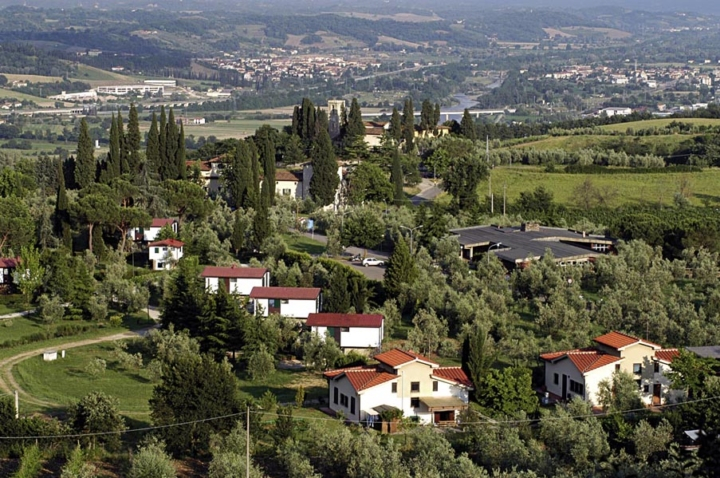
Apr 30, 2018 | Focolare Worldwide

Umberto Giannettoni
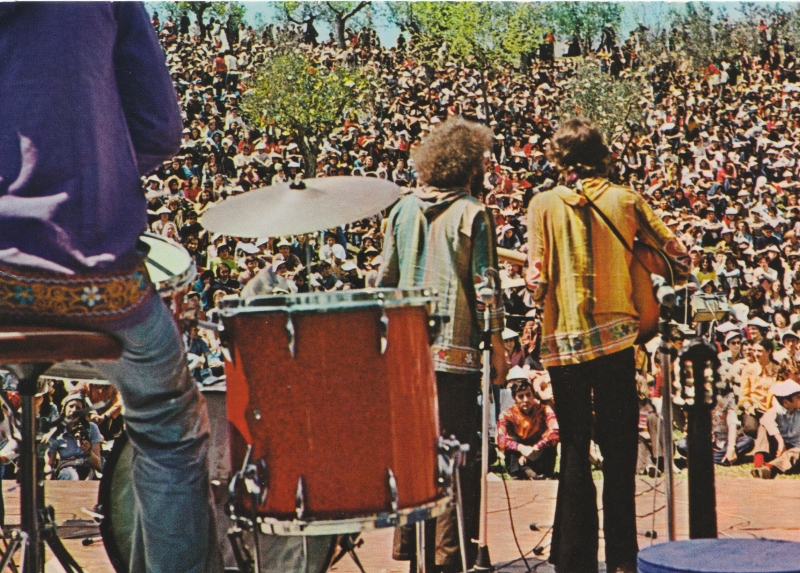 The first youth festival in Loppiano was on 1 May 1971. “After a meeting with the Prior of Taizé in Rocca di Papa (Rome), Chiara Lubich had described the town as a “town of the youth.” On a stopover in Loppiano on his way to Padua, Giorgio Marchetti, a close collaborator of Chiara, recounted what Chiara had said. This news for Umberto was like a flash of light in his soul, and he felt he had to answer Chiara immediately. During the weekend he organised an outing with the heads of the school of the focolare, to the Muraglione Pass in the Apennines. In a bar at the Pass he reflected on the possibility of holding a big meeting of young people in Loppiano, on the first of May […]. The young people of various zones and countries would be invited to participate with an artistic piece. When they left the bar, they were surprised by a particular scenery. The road was a sheet of ice. The rain had caused it after the lowering of the temperature. The vans couldn’t hold the road, and they had the impression that someone wanted to stop them from developing the decision made […].”
The first youth festival in Loppiano was on 1 May 1971. “After a meeting with the Prior of Taizé in Rocca di Papa (Rome), Chiara Lubich had described the town as a “town of the youth.” On a stopover in Loppiano on his way to Padua, Giorgio Marchetti, a close collaborator of Chiara, recounted what Chiara had said. This news for Umberto was like a flash of light in his soul, and he felt he had to answer Chiara immediately. During the weekend he organised an outing with the heads of the school of the focolare, to the Muraglione Pass in the Apennines. In a bar at the Pass he reflected on the possibility of holding a big meeting of young people in Loppiano, on the first of May […]. The young people of various zones and countries would be invited to participate with an artistic piece. When they left the bar, they were surprised by a particular scenery. The road was a sheet of ice. The rain had caused it after the lowering of the temperature. The vans couldn’t hold the road, and they had the impression that someone wanted to stop them from developing the decision made […].”  “There was a very talented group of young people in Loppiano. Among them was Heleno Oliveira, a young Brazilian singer-songwriter, who would have been a big help for the artistic part. Everyone worked hard. On 1 May 1971 in the natural amphitheatre in Campo Giallo, we saw the arrival of thousands and thousands of young people under a splendid sun. The event, to which many in Italy and Europe had contributed, resulted to be very effective for the youth who left in the evening, happy and filled with the divine they had experienced. From Trent came Paolo Bampi, a boy affected by leukaemia, who sang a captivating song: “…but what are you seeking, what do you want…” Then came Gen Rosso with the song, “God who is Love.” Then theatre pieces and dances followed. Each single number was given a “first prize,” which the jury awarded according to various reasons: beauty, unity, content, and commitment. It was a crescendo of sincere and explosive joy which contaminated everyone. As evening came, under the rays of a sun which turned everything gold and in a solemn calm after the intense day […] we strongly felt the presence of Mary.” After a second festive meeting of the youth in 1972 with an even greater attendance, “Chiara Lubich understood that it would be an important tool for the whole youth movement. She decided to involve the World Gen Centres which would participate in the organisation of the “Genfest” of 1973, still in Loppiano. In that year, Fr. Pasquale Foresi (cofounder of the Focolare Movement) was present and gave an important speech on the call to follow Jesus. In the open-air amphitheater, there were almost 10,000 young people. That was the birth of the Genfest! Source: www.loppiano.it Live streaming: https://www.primomaggioloppiano.it/live/
“There was a very talented group of young people in Loppiano. Among them was Heleno Oliveira, a young Brazilian singer-songwriter, who would have been a big help for the artistic part. Everyone worked hard. On 1 May 1971 in the natural amphitheatre in Campo Giallo, we saw the arrival of thousands and thousands of young people under a splendid sun. The event, to which many in Italy and Europe had contributed, resulted to be very effective for the youth who left in the evening, happy and filled with the divine they had experienced. From Trent came Paolo Bampi, a boy affected by leukaemia, who sang a captivating song: “…but what are you seeking, what do you want…” Then came Gen Rosso with the song, “God who is Love.” Then theatre pieces and dances followed. Each single number was given a “first prize,” which the jury awarded according to various reasons: beauty, unity, content, and commitment. It was a crescendo of sincere and explosive joy which contaminated everyone. As evening came, under the rays of a sun which turned everything gold and in a solemn calm after the intense day […] we strongly felt the presence of Mary.” After a second festive meeting of the youth in 1972 with an even greater attendance, “Chiara Lubich understood that it would be an important tool for the whole youth movement. She decided to involve the World Gen Centres which would participate in the organisation of the “Genfest” of 1973, still in Loppiano. In that year, Fr. Pasquale Foresi (cofounder of the Focolare Movement) was present and gave an important speech on the call to follow Jesus. In the open-air amphitheater, there were almost 10,000 young people. That was the birth of the Genfest! Source: www.loppiano.it Live streaming: https://www.primomaggioloppiano.it/live/
Apr 30, 2018 | Focolare Worldwide
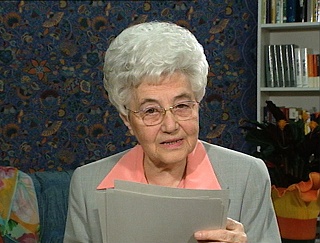
Apr 28, 2018 | Non categorizzato
 How did this adventure of unity begin? My dear friends, it began when not I, but Someone else, wanted it to begin. You may know that certain gifts are given to the world from time to time: they are called charisms. They come from the One who guides history, who leads it toward a very precise goal: the common good, by channeling towards the goal even the sad things that we men and women bring about in the world. It is God, God who is Love, in whom many of us firmly believe. One day, many years ago, one of these charisms came here too. Through it, we, who were young people at the time, understood that there was a wonderful design, a task, almost a mission entrusted to us: to work during our lives so that all may be one by putting love into action, in our own hearts and in that of others. Was it imagination? Utopia? No, certainly not, since Jesus prayed to his Father in heaven using these very words: “May they all be one”. Could God, the Father, not listen to the voice of God, the Son, with whom he is one God? We set out confidently toward this goal and now there are millions and millions of us – children, young people and adults – from almost every nation in the world. It is not possible to count how many we are. Of course, some of these people do not share our same faith, they might have another, or perhaps no religious faith at all. Nevertheless, they act with kindness and good will, sentiments which must be present in every human heart. So we journey together, with them too, towards the goal of a universal family, towards the building up of a united world. And, if God is with us, who can be against us? … Now it is up to you to carry the banner of our ideal. On one side is written unity, loving one another to the point of being ready to die for one another. On the other side, the means to reach this goal: effort, hard work, being ready even to suffer so that the world may become one family. You are young. You don’t lack courage. If we were able to do it, why not you? Chiara Lubich (From the archives of the Chiara Lubich Centre)
How did this adventure of unity begin? My dear friends, it began when not I, but Someone else, wanted it to begin. You may know that certain gifts are given to the world from time to time: they are called charisms. They come from the One who guides history, who leads it toward a very precise goal: the common good, by channeling towards the goal even the sad things that we men and women bring about in the world. It is God, God who is Love, in whom many of us firmly believe. One day, many years ago, one of these charisms came here too. Through it, we, who were young people at the time, understood that there was a wonderful design, a task, almost a mission entrusted to us: to work during our lives so that all may be one by putting love into action, in our own hearts and in that of others. Was it imagination? Utopia? No, certainly not, since Jesus prayed to his Father in heaven using these very words: “May they all be one”. Could God, the Father, not listen to the voice of God, the Son, with whom he is one God? We set out confidently toward this goal and now there are millions and millions of us – children, young people and adults – from almost every nation in the world. It is not possible to count how many we are. Of course, some of these people do not share our same faith, they might have another, or perhaps no religious faith at all. Nevertheless, they act with kindness and good will, sentiments which must be present in every human heart. So we journey together, with them too, towards the goal of a universal family, towards the building up of a united world. And, if God is with us, who can be against us? … Now it is up to you to carry the banner of our ideal. On one side is written unity, loving one another to the point of being ready to die for one another. On the other side, the means to reach this goal: effort, hard work, being ready even to suffer so that the world may become one family. You are young. You don’t lack courage. If we were able to do it, why not you? Chiara Lubich (From the archives of the Chiara Lubich Centre)
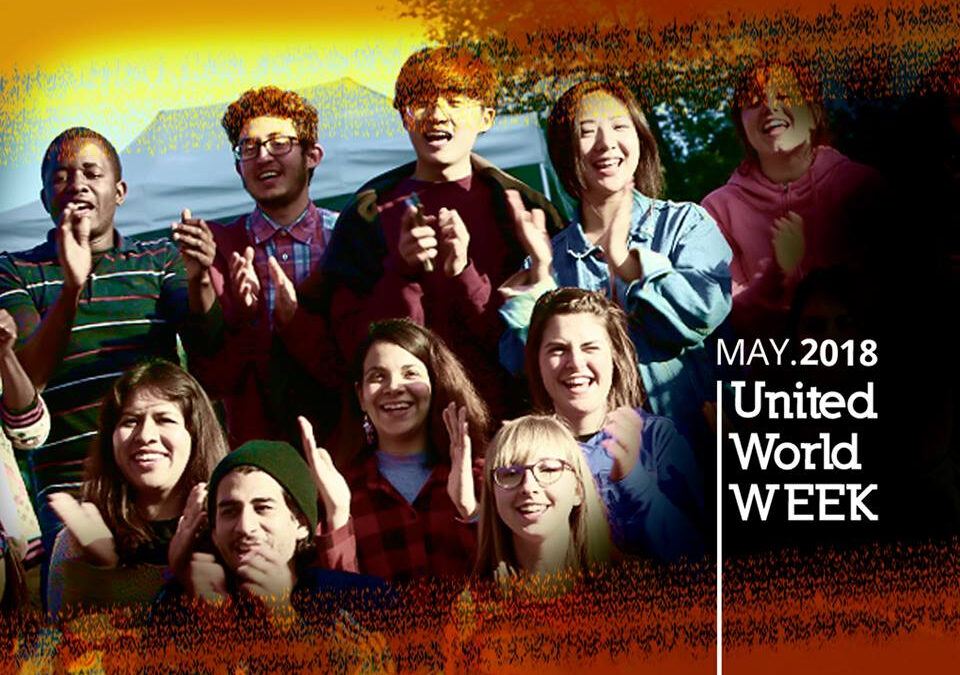
Apr 28, 2018 | Focolare Worldwide
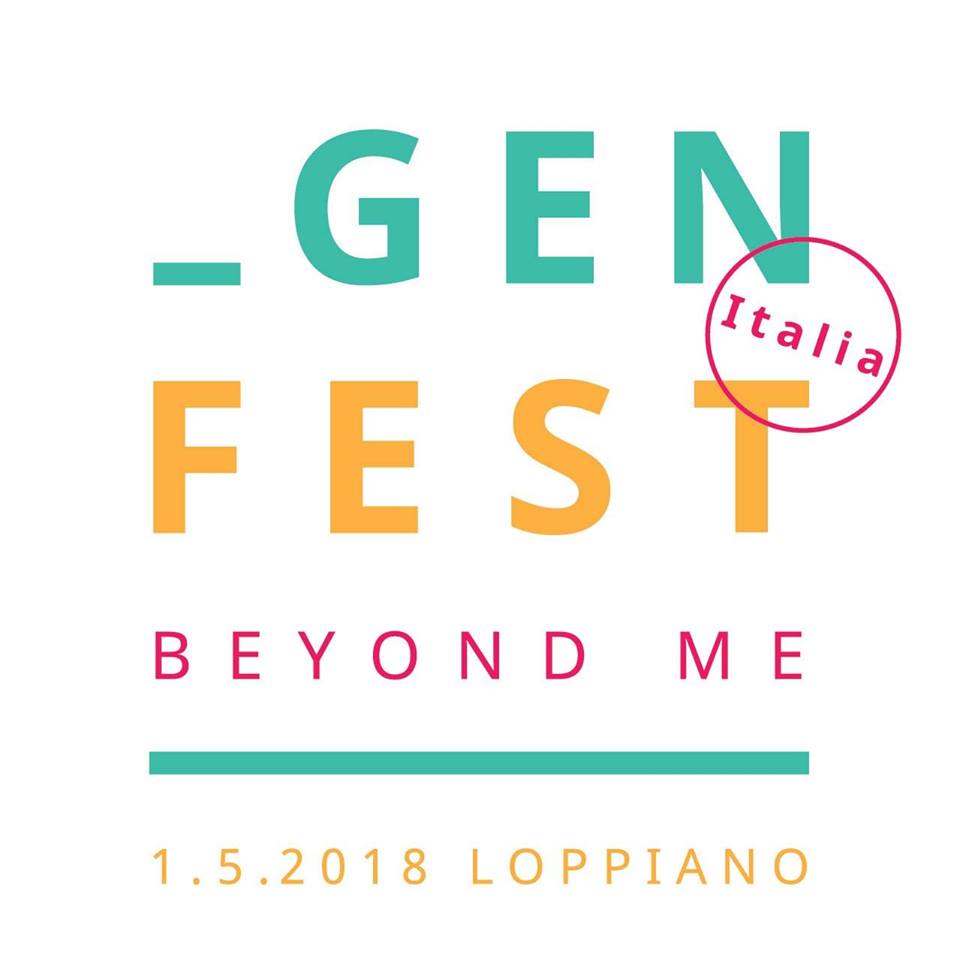 Zooming in on the young. Once again this year United World Week will be launched from the Focolare’s little town of Loppiano, Italy. Events will include a global network of projects marked by the spirit of brotherhood among peoples from a variety of cultures. This event has been held for over twenty years by the young members of the Focolare Movement who wish to bear witness not only to their peers, but also to public institutions that the dream of a united world has not been crushed by war or underneath the weight of social injustice – especially if the new generations who have been formed in a culture of peace are the ones taking the reins of society in their own hands. On May 1st, the Italian Focolare town will host one of the many “national” events in advance of the Genfest that will be held this year in Manila, Philippines (“Beyond all Borders, July 2018), and assemble 3 thousand young people from all over the world. It will be a festival to talk about the most difficult border to overcome when reaching out to others: oneself. “Beyond Me” will tell the stories of people who have wanted to bring about a change, beginning with themselves, stepping out of their comfort zones, to open themselves to such values as solidarity and to the needs of the people around them. For many of the young people, this experience of openness deepens its roots into a personal encounter with God, which has transformed their lives and allowed them to overcome their fears. For others, it has been overcoming an illness or disability or taking notice of someone else’s need. In name of a great friendship with the community of Nomadelfia and in view of the Pope’s visit to the two towns on May 10th, there will also be a large group of young people from Nomadelfia.
Zooming in on the young. Once again this year United World Week will be launched from the Focolare’s little town of Loppiano, Italy. Events will include a global network of projects marked by the spirit of brotherhood among peoples from a variety of cultures. This event has been held for over twenty years by the young members of the Focolare Movement who wish to bear witness not only to their peers, but also to public institutions that the dream of a united world has not been crushed by war or underneath the weight of social injustice – especially if the new generations who have been formed in a culture of peace are the ones taking the reins of society in their own hands. On May 1st, the Italian Focolare town will host one of the many “national” events in advance of the Genfest that will be held this year in Manila, Philippines (“Beyond all Borders, July 2018), and assemble 3 thousand young people from all over the world. It will be a festival to talk about the most difficult border to overcome when reaching out to others: oneself. “Beyond Me” will tell the stories of people who have wanted to bring about a change, beginning with themselves, stepping out of their comfort zones, to open themselves to such values as solidarity and to the needs of the people around them. For many of the young people, this experience of openness deepens its roots into a personal encounter with God, which has transformed their lives and allowed them to overcome their fears. For others, it has been overcoming an illness or disability or taking notice of someone else’s need. In name of a great friendship with the community of Nomadelfia and in view of the Pope’s visit to the two towns on May 10th, there will also be a large group of young people from Nomadelfia. 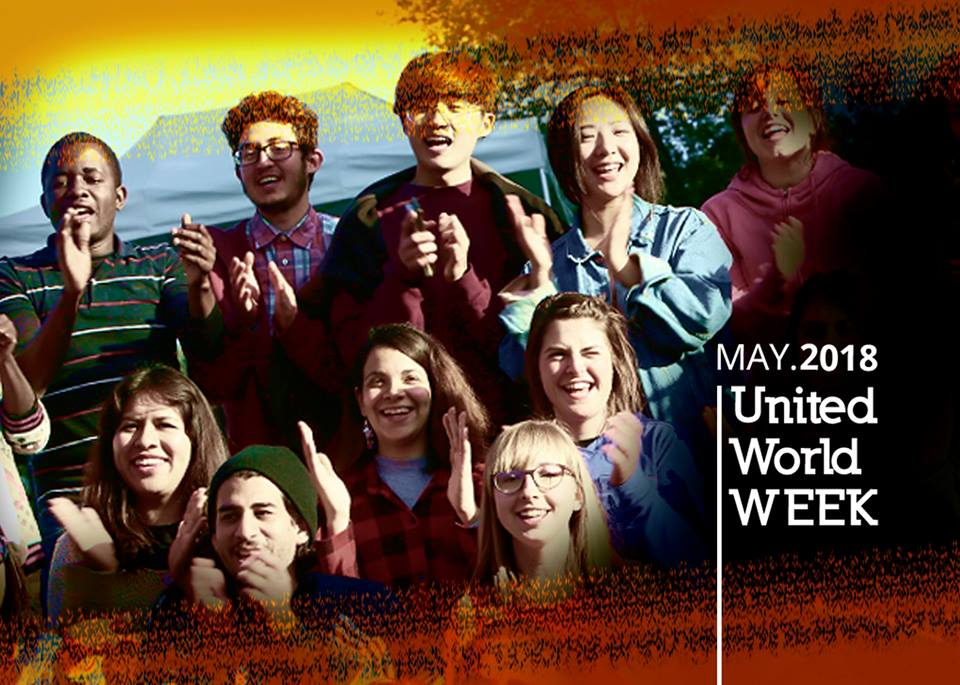 United World Week, which will begin right after, will be a single event located in different places around the world. It is an international expo that is an integral part of the United World Project, which for more than twenty years – the first edition in 1995 – returns every year at this time to promote peaceful relations and exchange among peoples and cultures, especially among the poor, marginalized and lonely, but not with out the help of famous people from the worlds of culture, sport, civil society and religion. Over time, United World Week gained ground on the local, national and supranational levels of public opinion through the social and mass media, and its projects in favor of brotherhood. The 2018 edition will focus on the topic “Generation Zero Hunger” one of 17 sustainable development objectives contained in the Agenda approved by the member States of the United Nations, to be reached by 2030. The teenagers and young people of the Focolare Movement have long been engaged in offering an important contribution to the project being brought forward by the Food and Agriculture Organization of the United Nations (FAO), with regard to things such as malnutrition, wasting food, respect for Nature and personal and collective projects geared towards the responsible use of the earth and its resources. Hence, the Week will be an opportunity to show the results of this collaboration and to engage other teenagers, citizens and institutions in reaching the goal. At the conclusion, on May 6th, the Run for Unity relay race will be held with hundred and thousands of teenagers of all nationalities, religions, cultures and ethnic groups. It will cover the earth, offering a testimony of “fraternity” from East to West. At every stop along the run – on foot or on bike – the most counter-current relay that exists will be enriched with sporting events, games, acts of solidarity and whatever else can help to bear witness that the dream of a united world lives on, in spite of the tensions or signs to the contrary. Perhaps these kids will be among the main actors. Chiara Favotti
United World Week, which will begin right after, will be a single event located in different places around the world. It is an international expo that is an integral part of the United World Project, which for more than twenty years – the first edition in 1995 – returns every year at this time to promote peaceful relations and exchange among peoples and cultures, especially among the poor, marginalized and lonely, but not with out the help of famous people from the worlds of culture, sport, civil society and religion. Over time, United World Week gained ground on the local, national and supranational levels of public opinion through the social and mass media, and its projects in favor of brotherhood. The 2018 edition will focus on the topic “Generation Zero Hunger” one of 17 sustainable development objectives contained in the Agenda approved by the member States of the United Nations, to be reached by 2030. The teenagers and young people of the Focolare Movement have long been engaged in offering an important contribution to the project being brought forward by the Food and Agriculture Organization of the United Nations (FAO), with regard to things such as malnutrition, wasting food, respect for Nature and personal and collective projects geared towards the responsible use of the earth and its resources. Hence, the Week will be an opportunity to show the results of this collaboration and to engage other teenagers, citizens and institutions in reaching the goal. At the conclusion, on May 6th, the Run for Unity relay race will be held with hundred and thousands of teenagers of all nationalities, religions, cultures and ethnic groups. It will cover the earth, offering a testimony of “fraternity” from East to West. At every stop along the run – on foot or on bike – the most counter-current relay that exists will be enriched with sporting events, games, acts of solidarity and whatever else can help to bear witness that the dream of a united world lives on, in spite of the tensions or signs to the contrary. Perhaps these kids will be among the main actors. Chiara Favotti
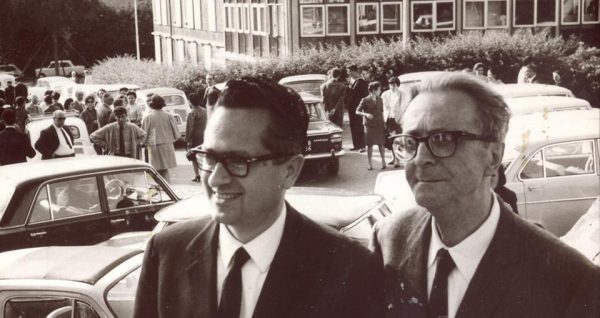
Apr 27, 2018 | Non categorizzato

Tommaso Sorgi with Igino Giordani
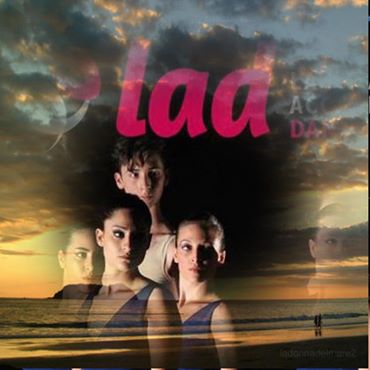
Apr 26, 2018 | Non categorizzato
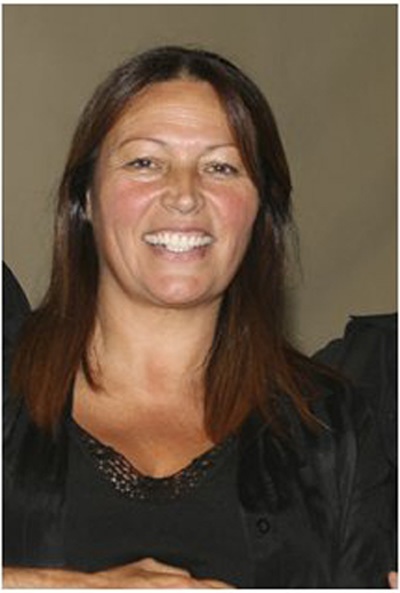
Antonella Lombardo
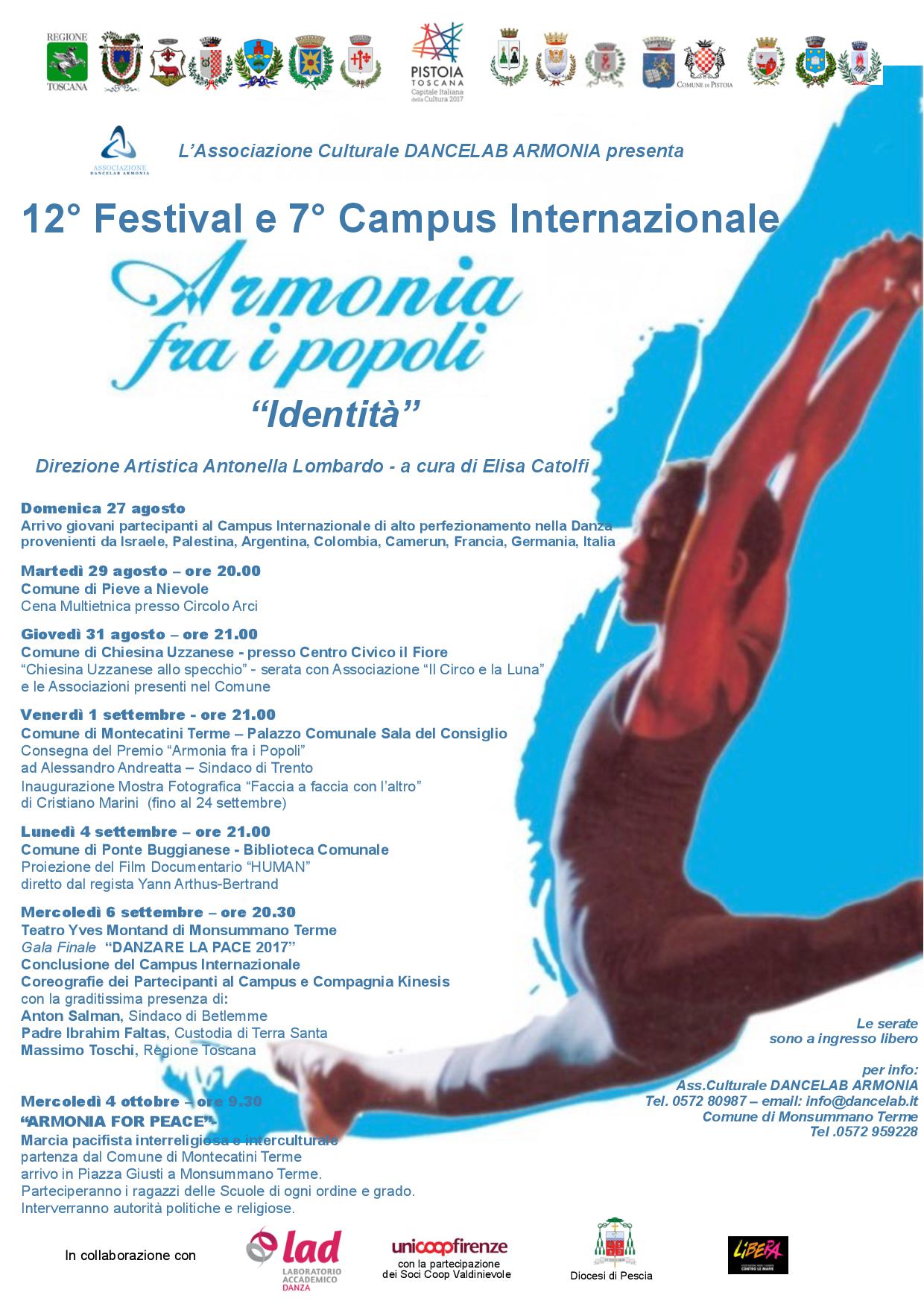 That was the beginning of the Harmony DanceLab Association. The aim of this association is to develop dance as a means of creating harmony and dialogue among different cultures and so contribute to peace in the world. For the last thirteen years it has organised “Harmony among People” an international festival, involving not only a dance school of students from areas of conflict in Palestine and Israel but also many people from the local community. Peace education underpins the professional and human formation that the students receive. Over the years, the Association has spread to various parts of Italy and Budapest and, since 2014, has worked in the Middle East with the John Paul II Foundation and in collaboration with the “Children Without Borders” Institute and Custodians of the Holy Land. Antonella continues, “Peace is not just a goal to reach but an everyday process that requires great effort and commitment. It is an educational challenge. Students learn dance techniques but also experience the power of a language that is superior to Art. On the last evening, they tell everyone about the respect, understanding and fraternity they have experienced.” An intercultural and inter religious Peace March is also part of the project. This takes place every year on the 4th October and draws people from institutions, schools, voluntary groups and faith communities (Christian, Muslim and Jewish) in Tuscany.
That was the beginning of the Harmony DanceLab Association. The aim of this association is to develop dance as a means of creating harmony and dialogue among different cultures and so contribute to peace in the world. For the last thirteen years it has organised “Harmony among People” an international festival, involving not only a dance school of students from areas of conflict in Palestine and Israel but also many people from the local community. Peace education underpins the professional and human formation that the students receive. Over the years, the Association has spread to various parts of Italy and Budapest and, since 2014, has worked in the Middle East with the John Paul II Foundation and in collaboration with the “Children Without Borders” Institute and Custodians of the Holy Land. Antonella continues, “Peace is not just a goal to reach but an everyday process that requires great effort and commitment. It is an educational challenge. Students learn dance techniques but also experience the power of a language that is superior to Art. On the last evening, they tell everyone about the respect, understanding and fraternity they have experienced.” An intercultural and inter religious Peace March is also part of the project. This takes place every year on the 4th October and draws people from institutions, schools, voluntary groups and faith communities (Christian, Muslim and Jewish) in Tuscany.  How many young people have you met in your career as a teacher of dance? “Thousands. Dance is difficult and demanding but young people are drawn to it. TV talent shows also attract people but give a distorted idea about what is truly art. You have to provide an experiential dimension to make an impact as a teacher. Nowadays, young people do not accept the theory without experiencing the importance of it for themselves.” Does art have a social value? Antonella Lombardo is certain that it does. “Art is like the prophecy of a new type of Humanism – a means of achieving social harmony. It is a reflection of Beauty that is Love. In conclusion, she says, “Keeping this in mind as I carry out my profession has changed my life totally. I have found meaning in what previously seemed to have no sense. I try to give young people the opportunity to do the same so that their lives might be a work of art, just as Chiara Lubich taught me.” Chiara Favotti See also: www.festivalarmonia.org, www.dancelab.it
How many young people have you met in your career as a teacher of dance? “Thousands. Dance is difficult and demanding but young people are drawn to it. TV talent shows also attract people but give a distorted idea about what is truly art. You have to provide an experiential dimension to make an impact as a teacher. Nowadays, young people do not accept the theory without experiencing the importance of it for themselves.” Does art have a social value? Antonella Lombardo is certain that it does. “Art is like the prophecy of a new type of Humanism – a means of achieving social harmony. It is a reflection of Beauty that is Love. In conclusion, she says, “Keeping this in mind as I carry out my profession has changed my life totally. I have found meaning in what previously seemed to have no sense. I try to give young people the opportunity to do the same so that their lives might be a work of art, just as Chiara Lubich taught me.” Chiara Favotti See also: www.festivalarmonia.org, www.dancelab.it
Apr 26, 2018 | Non categorizzato, Word of
for ages 4-8 | for ages 9-17 | Print | Audio
St. Paul was writing to Christians in the region of Galatia, who had heard the Gospel proclamation from him. He was scolding them for not understanding the true meaning of Christian freedom. For the people of Israel, freedom was a gift from God who had brought them out of slavery in Egypt and led them to a new land, establishing a pact of mutual faithfulness with them. At the same time, Paul strongly affirmed that Christian freedom is a gift from Jesus. In fact, Jesus makes it possible for us, in him and like him, to become children of God who is love. By imitating the Father as Jesus taught us and showed us through his life, we too can learn to have the same attitude of mercy towards everyone, and be at their service. (Mt 5:43-48; Lk 6:36; Mk 10:45). For Paul, the apparent contradiction in “freedom to serve” is possible through the gift of the Spirit that Jesus gave to humanity by his death on the cross. It is the Spirit who gives us the strength to come out of our prison of selfishness, which is burdened with divisions, injustices, betrayals, and violence. He leads us to true freedom. “By contrast, the fruit of the Spirit is love, joy, peace, patience, kindness, generosity, faithfulness, gentleness, and self-control.“ Besides being a gift, Christian freedom is also a commitment. Above all, it is a commitment to welcome the Spirit into our hearts, making room for him and recognizing his voice in us. “Above all, we must become more and more aware of the presence of the Holy Spirit in us,” Chiara Lubich wrote in the October issue of Città Nuova in 2000. “We have a great treasure in our innermost being, but are not sufficiently aware of it … To hear the voice of the Spirit and follow it, we must say no … to temptation, reject its suggestions and say yes to the tasks God has entrusted to us; yes to love for our neighbors; yes to the trials and difficulties we encounter… By doing so, the Holy Spirit will guide us and give our Christian life gusto, vigor, drive and brightness, without which it cannot be authentic. Then, whoever is with us will notice that we are not only children of our natural family, but also children of God.” In fact, the Spirit calls us to step aside from being the center of our concerns in order to be more receptive to others, to listen to them and share material and spiritual goods. He calls us to forgive or take care of the most varied people in different situations of daily life. This attitude allows us to experience the typical fruit of the spirit: our personal growth toward true freedom. This brings out and develops talents and resources in us that would have stayed buried and unknown had we continued living wrapped up in ourselves. Every action of ours is an opportunity not to be missed, to say no to the slavery of selfishness and yes to the freedom of loving. “By contrast, the fruit of the Spirit is love, joy, peace, patience, kindness, generosity, faithfulness, gentleness, and self-control.“ Those who accept the work of the Spirit in their hearts also contribute toward building positive human relations through their daily activities, at home and in society. Carlo Colombino, an entrepreneur, husband and father, owns a company in northern Italy. Out of his 60 employees, around a quarter are not Italian and some of them have had traumatic past experiences. “Even the workplace can and should facilitate their integration,” he told a journalist. “Our work includes quarrying and recycling construction materials, and I have responsibilities toward the environment and the area where I live. Some years ago, the economic crisis hit us hard: should I save the business or the employees? We made some people redundant, talking it over with them and finding the least painful solutions. It was a dramatic experience with sleepless nights. “I can do my job either well or poorly. I try to do it as best I can. I believe in the positive influence of ideas. A business focused only on turnover and figures will not last long. People must be at the center of all we do. I believe in God and am convinced that harmonizing business and solidarity is not a dream.” Let’s courageously set in motion our personal call to freedom, in the environment where we live and work. This will allow the Spirit to touch and renew the lives of many people around us, and move history toward a future of “joy, peace, patience, kindness.” Letizia Magri 3 Cfr. C. Lubich, We have a Treasure, New City, 44 (2000), 10, p. 7.
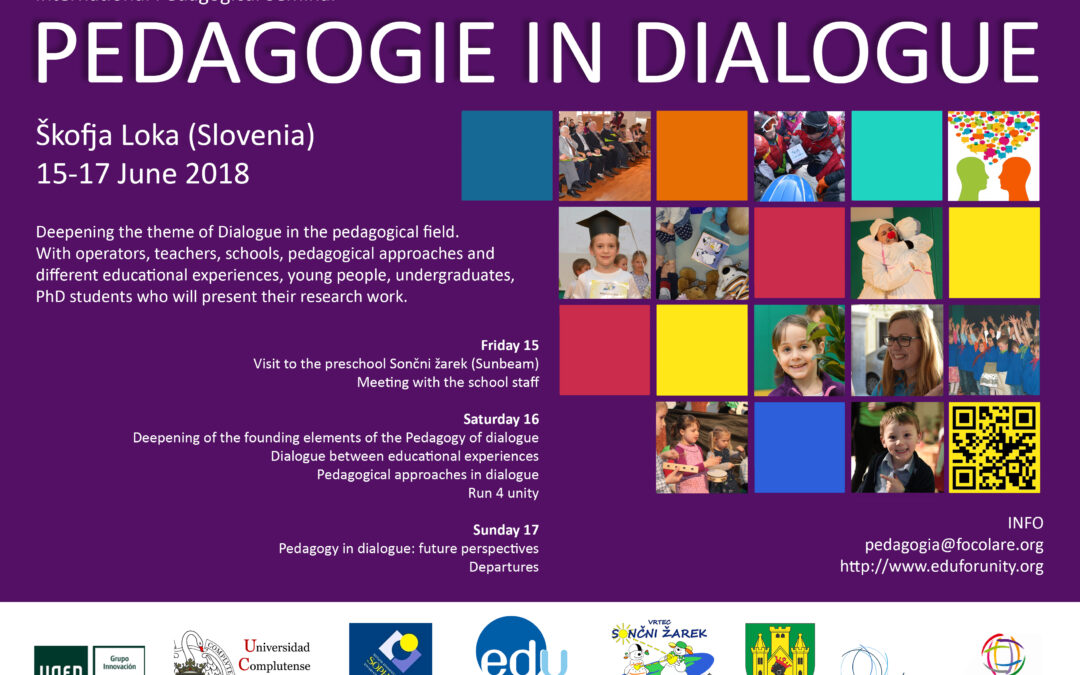
Apr 26, 2018 | Non categorizzato
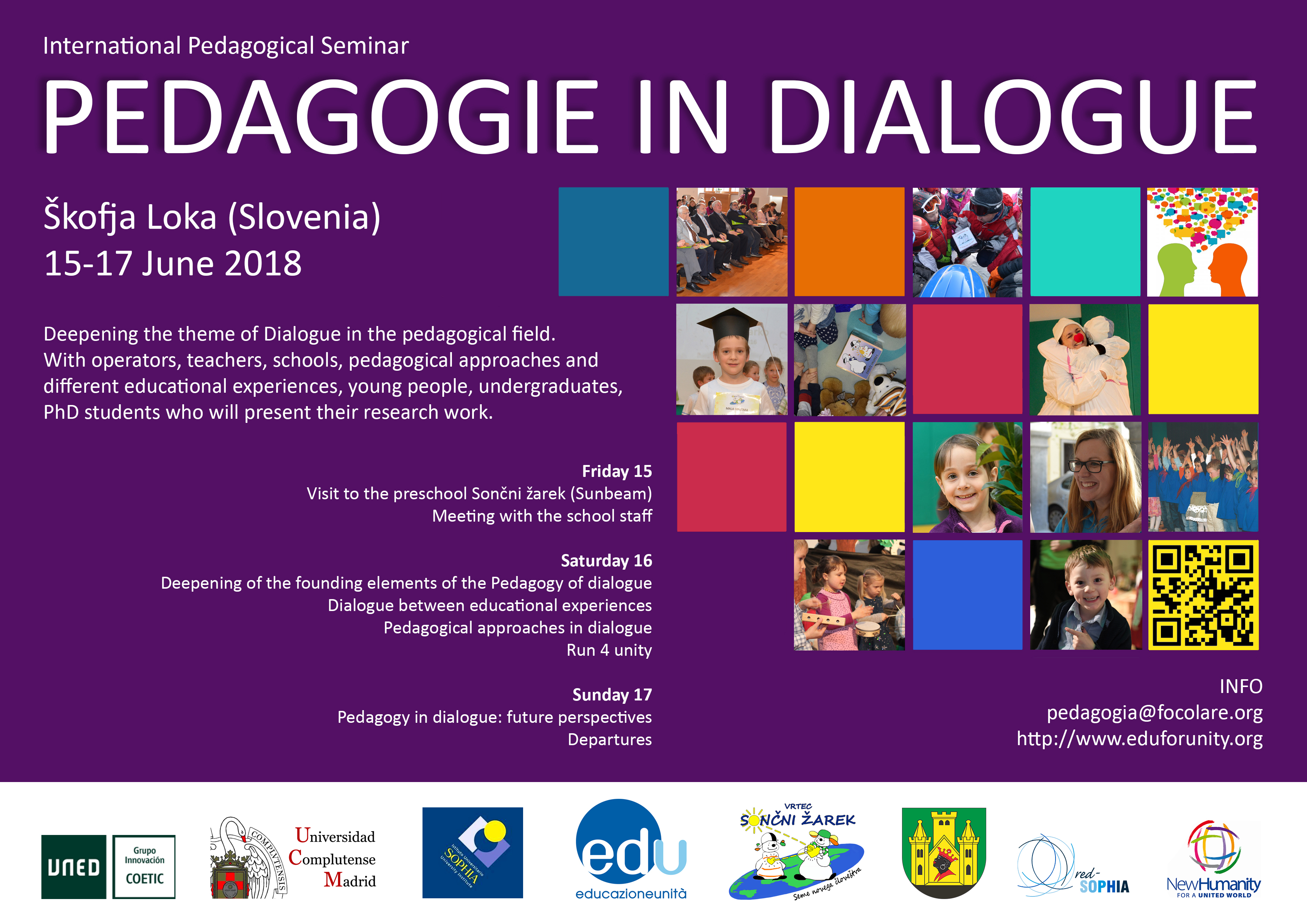 Deepening the theme of Dialogue in the pedagogical field. With operators, teachers, schools, pedagogical approaches and different educational experiences, young people, undergraduates, PhD students who will present their research work. Info: pedagogia@focolare.org Education for Unity
Deepening the theme of Dialogue in the pedagogical field. With operators, teachers, schools, pedagogical approaches and different educational experiences, young people, undergraduates, PhD students who will present their research work. Info: pedagogia@focolare.org Education for Unity













 Deepening the theme of Dialogue in the pedagogical field. With operators, teachers, schools, pedagogical approaches and different educational experiences, young people, undergraduates, PhD students who will present their research work. Info:
Deepening the theme of Dialogue in the pedagogical field. With operators, teachers, schools, pedagogical approaches and different educational experiences, young people, undergraduates, PhD students who will present their research work. Info: